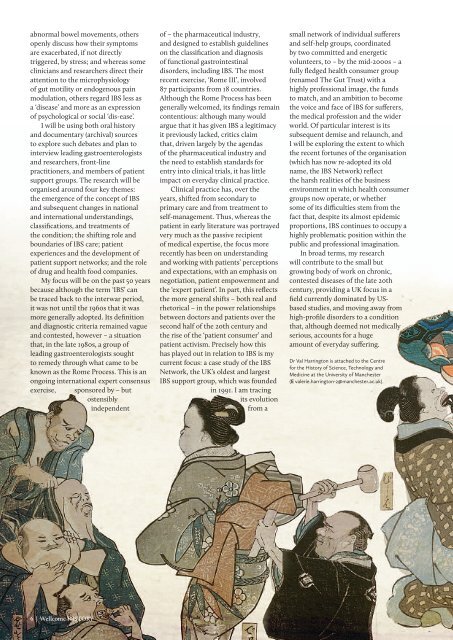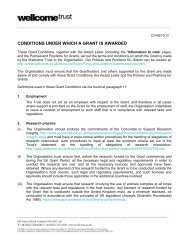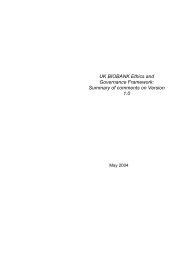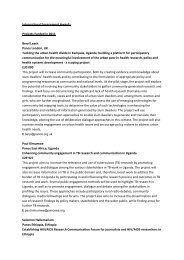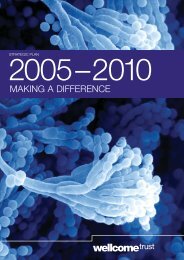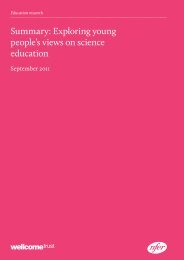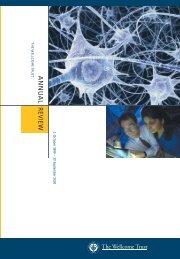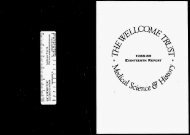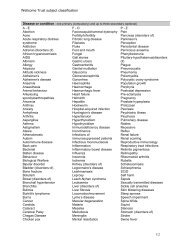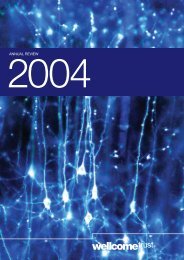(1839–1910) Medical history in Japan - Wellcome Trust
(1839–1910) Medical history in Japan - Wellcome Trust
(1839–1910) Medical history in Japan - Wellcome Trust
Create successful ePaper yourself
Turn your PDF publications into a flip-book with our unique Google optimized e-Paper software.
abnormal bowel movements, othersopenly discuss how their symptomsare exacerbated, if not directlytriggered, by stress; and whereas somecl<strong>in</strong>icians and researchers direct theirattention to the microphysiologyof gut motility or endogenous pa<strong>in</strong>modulation, others regard IBS less asa ‘disease’ and more as an expressionof psychological or social ‘dis-ease’.I will be us<strong>in</strong>g both oral <strong>history</strong>and documentary (archival) sourcesto explore such debates and plan to<strong>in</strong>terview lead<strong>in</strong>g gastroenterologistsand researchers, front-l<strong>in</strong>epractitioners, and members of patientsupport groups. The research will beorganised around four key themes:the emergence of the concept of IBSand subsequent changes <strong>in</strong> nationaland <strong>in</strong>ternational understand<strong>in</strong>gs,classifications, and treatments ofthe condition; the shift<strong>in</strong>g role andboundaries of IBS care; patientexperiences and the development ofpatient support networks; and the roleof drug and health food companies.My focus will be on the past 50 yearsbecause although the term ‘IBS’ canbe traced back to the <strong>in</strong>terwar period,it was not until the 1960s that it wasmore generally adopted. Its def<strong>in</strong>itionand diagnostic criteria rema<strong>in</strong>ed vagueand contested, however – a situationthat, <strong>in</strong> the late 1980s, a group oflead<strong>in</strong>g gastroenterologists soughtto remedy through what came to beknown as the Rome Process. This is anongo<strong>in</strong>g <strong>in</strong>ternational expert consensusexercise, sponsored by − butostensibly<strong>in</strong>dependentof − the pharmaceutical <strong>in</strong>dustry,and designed to establish guidel<strong>in</strong>eson the classification and diagnosisof functional gastro<strong>in</strong>test<strong>in</strong>aldisorders, <strong>in</strong>clud<strong>in</strong>g IBS. The mostrecent exercise, ‘Rome III’, <strong>in</strong>volved87 participants from 18 countries.Although the Rome Process has beengenerally welcomed, its f<strong>in</strong>d<strong>in</strong>gs rema<strong>in</strong>contentious: although many wouldargue that it has given IBS a legitimacyit previously lacked, critics claimthat, driven largely by the agendasof the pharmaceutical <strong>in</strong>dustry andthe need to establish standards forentry <strong>in</strong>to cl<strong>in</strong>ical trials, it has littleimpact on everyday cl<strong>in</strong>ical practice.Cl<strong>in</strong>ical practice has, over theyears, shifted from secondary toprimary care and from treatment toself-management. Thus, whereas thepatient <strong>in</strong> early literature was portrayedvery much as the passive recipientof medical expertise, the focus morerecently has been on understand<strong>in</strong>gand work<strong>in</strong>g with patients’ perceptionsand expectations, with an emphasis onnegotiation, patient empowerment andthe ‘expert patient’. In part, this reflectsthe more general shifts – both real andrhetorical − <strong>in</strong> the power relationshipsbetween doctors and patients over thesecond half of the 20th century andthe rise of the ‘patient consumer’ andpatient activism. Precisely how thishas played out <strong>in</strong> relation to IBS is mycurrent focus: a case study of the IBSNetwork, the UK’s oldest and largestIBS support group, which was founded<strong>in</strong> 1991. I am trac<strong>in</strong>gits evolutionfrom asmall network of <strong>in</strong>dividual sufferersand self-help groups, coord<strong>in</strong>atedby two committed and energeticvolunteers, to – by the mid-2000s – afully fledged health consumer group(renamed The Gut <strong>Trust</strong>) with ahighly professional image, the fundsto match, and an ambition to becomethe voice and face of IBS for sufferers,the medical profession and the widerworld. Of particular <strong>in</strong>terest is itssubsequent demise and relaunch, andI will be explor<strong>in</strong>g the extent to whichthe recent fortunes of the organisation(which has now re-adopted its oldname, the IBS Network) reflectthe harsh realities of the bus<strong>in</strong>essenvironment <strong>in</strong> which health consumergroups now operate, or whethersome of its difficulties stem from thefact that, despite its almost epidemicproportions, IBS cont<strong>in</strong>ues to occupy ahighly problematic position with<strong>in</strong> thepublic and professional imag<strong>in</strong>ation.In broad terms, my researchwill contribute to the small butgrow<strong>in</strong>g body of work on chronic,contested diseases of the late 20thcentury, provid<strong>in</strong>g a UK focus <strong>in</strong> afield currently dom<strong>in</strong>ated by USbasedstudies, and mov<strong>in</strong>g away fromhigh-profile disorders to a conditionthat, although deemed not medicallyserious, accounts for a hugeamount of everyday suffer<strong>in</strong>g.Dr Val Harr<strong>in</strong>gton is attached to the Centrefor the History of Science, Technology andMedic<strong>in</strong>e at the University of Manchester(E valerie.harr<strong>in</strong>gton-2@manchester.ac.uk).6 | <strong>Wellcome</strong> HISTORY


